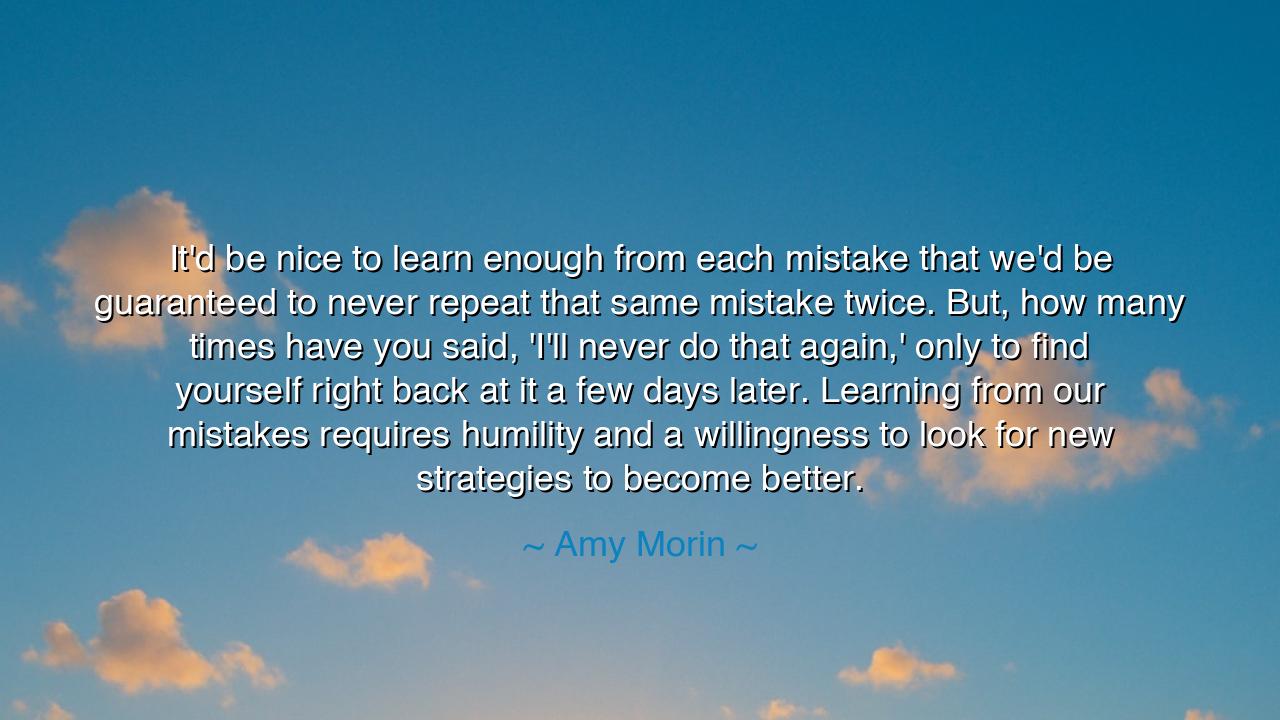
It'd be nice to learn enough from each mistake that we'd be
It'd be nice to learn enough from each mistake that we'd be guaranteed to never repeat that same mistake twice. But, how many times have you said, 'I'll never do that again,' only to find yourself right back at it a few days later. Learning from our mistakes requires humility and a willingness to look for new strategies to become better.






“It’d be nice to learn enough from each mistake that we’d be guaranteed to never repeat that same mistake twice. But how many times have you said, ‘I’ll never do that again,’ only to find yourself right back at it a few days later? Learning from our mistakes requires humility and a willingness to look for new strategies to become better,” said Amy Morin, a teacher of mental strength and the quiet discipline of self-awareness. Her words ring with a truth as old as humankind — that wisdom is not won in a single victory, but in the long, uneven battle against our own weakness. She speaks not to condemn, but to awaken — reminding us that the path of growth is carved not by perfection, but by the courage to rise after every fall.
To learn from our mistakes is one of life’s most sacred and difficult arts. Each misstep offers a lesson, but the human heart is stubborn, bound by habit, pride, and emotion. We tell ourselves, “I’ll never do that again,” and yet we return — to the same anger, the same fear, the same temptation — as though some unseen hand pulls us back into the fire we swore to leave behind. Amy Morin reveals that the true barrier is not ignorance, but humility. For to truly learn, one must first bow before the truth of one’s own imperfection. The proud see their mistakes as shame; the wise see them as teachers.
The ancients knew this well. The philosopher Aristotle wrote that excellence is not an act, but a habit — yet habits are not easily broken, for they are chains forged in the mind. When we fail, we do not simply err in action, but in thought. To change our ways, we must seek new strategies, new paths of understanding, not merely repeat the same promises to ourselves. Without reflection, failure becomes a cycle; with humility, it becomes transformation. The mistake repeated is a prison; the mistake examined is a doorway.
Consider the story of Thomas Edison, whose journey toward invention was paved with thousands of failures. When asked how he endured so many setbacks, he replied, “I have not failed. I’ve just found ten thousand ways that won’t work.” Edison understood what Amy Morin teaches: that each mistake is a map, marking the paths that do not lead to truth. His greatness did not come from avoiding failure, but from his relentless willingness to learn, adapt, and begin anew. His humility before error was his strength.
But not all lessons are of invention and intellect; some are of the heart. How many have promised never to trust the wrong person again, only to do so once more? How many have vowed to control their temper, to resist fear, to stay kind in the face of cruelty — and still faltered? It is because human growth is not a straight road but a spiral. We circle the same challenges again and again, but each time, if we are humble, we meet them from a higher place. This is the rhythm of true learning: we stumble upon the same stone until we learn not only to step over it, but to understand why we tripped at all.
Humility is the key that unlocks this progress. Without it, we are blind to our own patterns. We justify instead of examine; we defend instead of reflect. To admit fault without despair, to face error without shame — this is the mark of strength. The willingness to seek new strategies is the child of humility; it says, “Perhaps there is a better way, and I am not yet wise enough to see it.” The one who humbles himself before his own ignorance is the one who will rise wiser with each passing failure.
From this truth, let us draw the lesson: do not curse your mistakes, but honor them as the necessary teachers of life. When you fall, pause and ask not, “Why did I fail?” but “What is this failure trying to show me?” Then act differently — for understanding without action is not yet wisdom. Build new habits. Seek counsel. Reflect daily. Forgive yourself, and begin again. Every error, honestly faced, becomes a stepping-stone toward mastery.
Thus, remember Amy Morin’s wisdom as the ancients remembered the sayings of their sages: that learning from mistakes is not a gift of talent, but a practice of humility. The strong are not those who never stumble, but those who learn, adapt, and persevere with grace. For the one who learns deeply from error grows beyond it, while the one who refuses to learn remains forever bound. So walk bravely through your failures — not as curses, but as guides — and in time, you will find that even your greatest mistakes were preparing you for wisdom.






AAdministratorAdministrator
Welcome, honored guests. Please leave a comment, we will respond soon